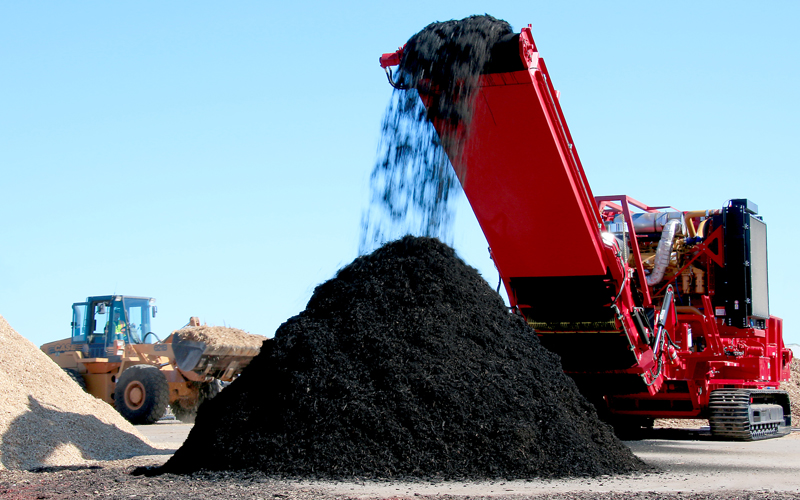
Could your business be generating additional opportunities and revenue by creating a marketable end product from your by-products?
Finding a product
Many businesses including lumbermills, pallet shops, landfills and logging companies are already producing by-products that are ideal for making mulch. Instead of giving away the by-products to someone else who is going to make money off it – why not increase profits for your own business by finding an alternative solution.
Contamination, moisture, and temperature all play a role in what end users want to purchase. Typically, virgin mill by-products make the best finished mulch product because it is clean and does not contain possible nails or other contaminants, meaning it can be sold for a premium price. Companies can also use recycled sorted construction & demolition (C&D) debris, pallets, and green waste to produce colored landscape mulch.
Although mulch produced with green waste looks good it tends to mold, due to temperature and moisture. This risk can be mitigated by mixing in kiln dried wood, which can help decrease the likelihood that a green waste mulch will mold. Colorant was originally designed for pallets, but in addition to wood products we’ve seen recycled asphalt roofing shingles (RAS), walnut shells, and peach pits colored and used as a mulch end product. You can color almost anything – it’s finding a market for it.
Example: A new housing subdivision is developed, instead of moving all the scrap wood from the project, store the wood on site, then grind and color for landscape mulch for the project. This could potentially save thousands of dollars on transportation costs and fees form the landfill where the scrap is destined to go – and provide an additional marketable benefit.
Cost effectiveness
The most cost-effective materials to grind for mulch are recycled C&D, pallet scrap, and green waste. The materials usually have a tipping fee that pays for the handling and grinding process. Conversely, these materials also take more color and water to get the same color fastness that you would get from virgin forest by-products like bark, slab wood and chips.
You can call on the industry expertise of your grinder and color sales representatives to help you determine the best solution for your business. Simple tips such as prewetting your kiln-dried or low moisture material before coloring and the benefits it provides can save time and money. It’s not a one size fits all recipe so what works best for one mulch producer will not always be the most cost effective or easiest option for another.
Rotochopper Advantage
A Rotochopper horizontal grinder equipped with a colorizer can add value to your mulch operation on several levels.
- Our equipment. We have multiple machines in our product offering to fit any size producer, our unique grind and color process, and our factory-direct approach to sales, service, and parts fulfillment.
- Production capabilities. Our horizontal grinders are available in a range of size and horsepower to fit the smallest to the largest producer.
- We are constantly innovating, RotoLink® remote monitoring system can be used to track production, StopWatch monitoring system monitors rotor vibration and will reverse the infeed if it hits tramp metal, our patented replaceable mount rotor for quick tooth and mount replacements, colorizer system that thoroughly colors and saturates mulch during the grinding process, and our patented screen change system that is safe and easy.
Finding opportunities
The best way to go about looking for business opportunities is first looking at your own business model to determine if you have a by-product that can be used to produce mulch. Also checking with landscaping companies to verify if there is a need in the market, market size and how far consumers will travel to pick up product or if it is financially feasible.
For example, take eucalyptus mulch, prior to eucalyptus trees being used for mulch, there wasn’t much of a market for it. People were paying to get rid of it, so someone decided to grind it, color it & test it. Now eucalyptus mulch is very lucrative. They put a positive spin on a by-product that no one wanted by coming up with an alternative, profitable solution. An added bonus is that it smells good and helps repel insects. There are plenty of opportunities out there if you can create a market for it.
Working with your grinder sales representative, colorant representative, and networking with other professionals will help you build your business.
